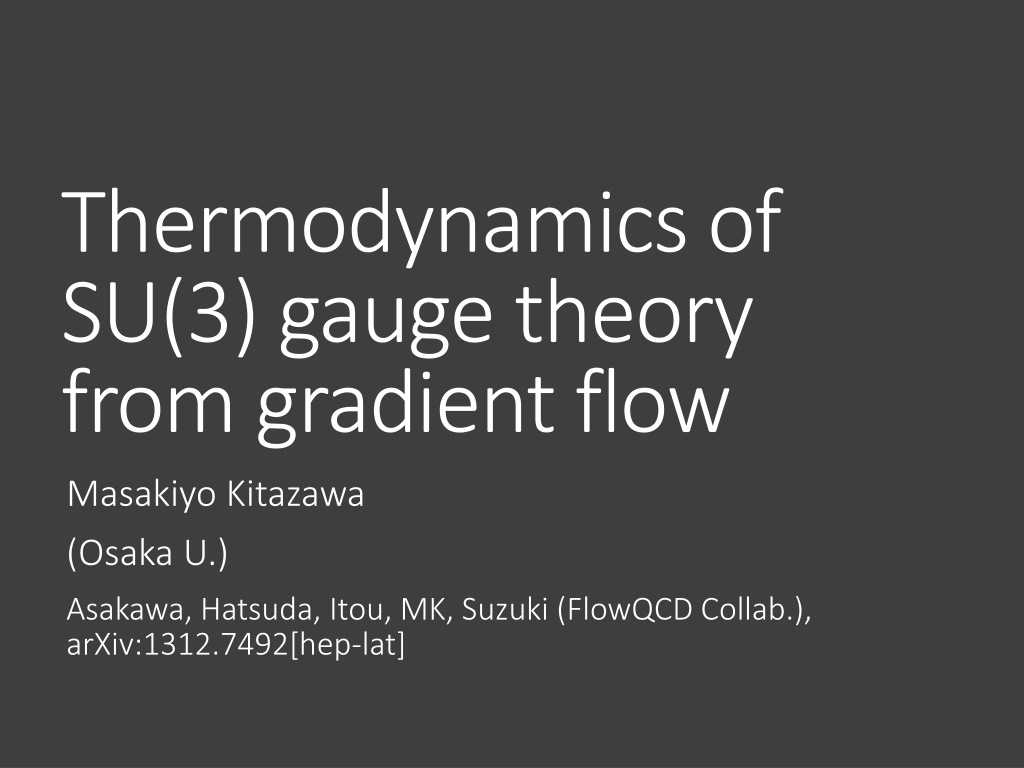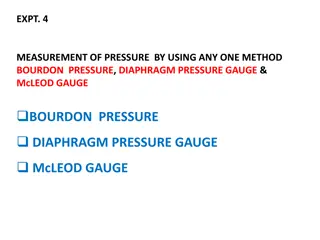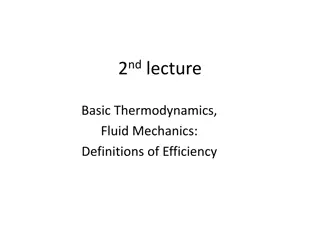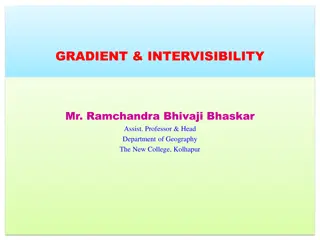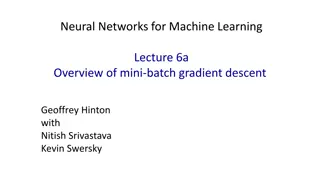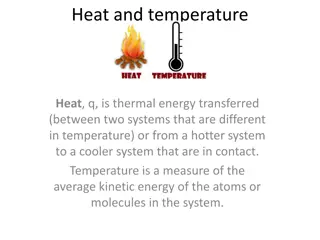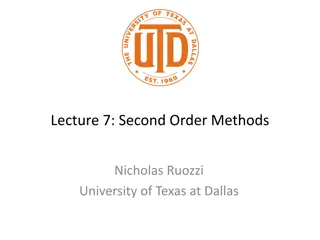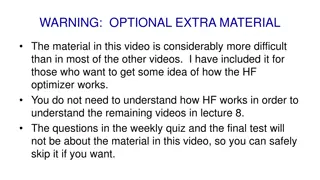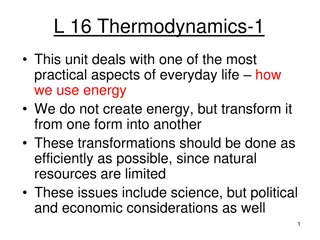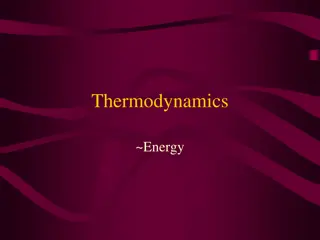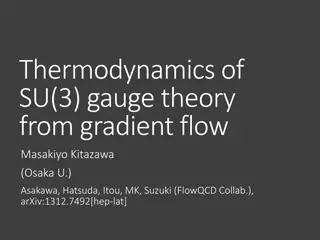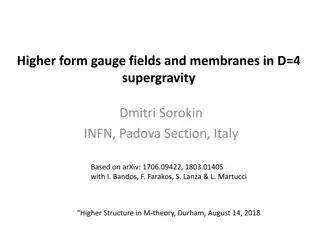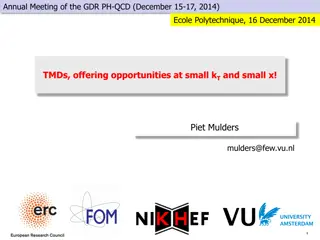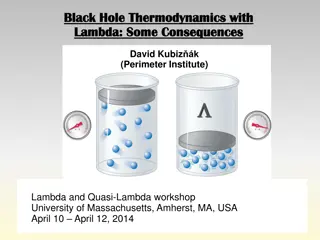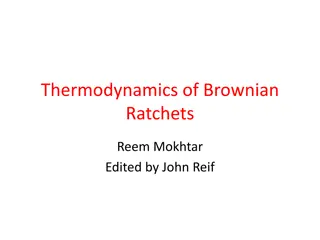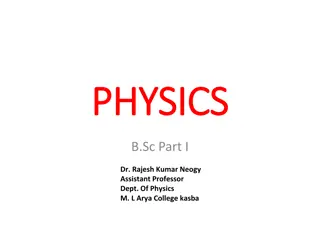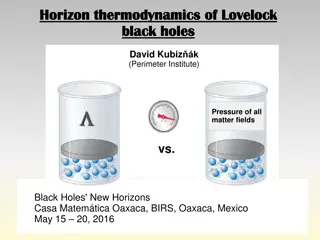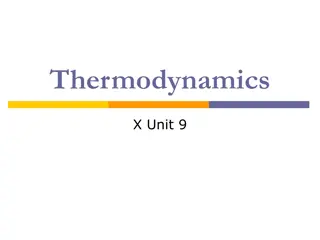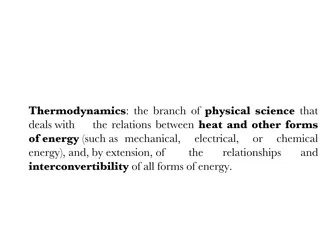Thermodynamics of SU(3) Gauge Theory from Gradient Flow
Investigate nontrivial observables on the lattice, fluctuations, correlations, and the impact of coarse graining on the theory. Explore applications of gradient flow in understanding the energy-momentum tensor and operator relations in gauge theory.
Download Presentation

Please find below an Image/Link to download the presentation.
The content on the website is provided AS IS for your information and personal use only. It may not be sold, licensed, or shared on other websites without obtaining consent from the author.If you encounter any issues during the download, it is possible that the publisher has removed the file from their server.
You are allowed to download the files provided on this website for personal or commercial use, subject to the condition that they are used lawfully. All files are the property of their respective owners.
The content on the website is provided AS IS for your information and personal use only. It may not be sold, licensed, or shared on other websites without obtaining consent from the author.
E N D
Presentation Transcript
Thermodynamics of SU(3) gauge theory from gradient flow Masakiyo Kitazawa (Osaka U.) Asakawa, Hatsuda, Itou, MK, Suzuki (FlowQCD Collab.), arXiv:1312.7492[hep-lat]
energymomentum Poincare symmetry pressure stress
: nontrivial observable on the lattice Definition of the operator is nontrivial because of the explicit breaking of Lorentz symmetry ex: Its measurement is extremely noisy due to high dimensionality and etc.
Fluctuations and Correlations viscosity, specific heat, ... Thermodynamics direct measurement of expectation values If we have vacuum configuration mixed state on 1sttransition confinement string EM distribution in hadrons Vacuum Structure Hadron Structure
(Too) Rough Idea coarse graining Translational symmetry recovers Smeared theory tends to be less noisy
Gradient Flow and Energy-Momentum Tensor
YM Gradient Flow Luescher, 2010 t: flow time dim:[length2]
YM Gradient Flow Luescher, 2010 t: flow time dim:[length2] smoothing similarly to diffusion equation diffusion length All composite operators at t>0 are UV finite Luescher,Weisz,2011
Applications of Gradient Flow scale setting operator relation topology, autocorrelation, etc.
Operator Relation Luescher, Weisz, 2011 remormalized operators of original theory an operator at t>0 original 4-dim theory t 0 limit
Constructing EMT Suzuki, 2013 gauge-invariant dimension 4 operators
Constructing EMT 2 Suzuki, 2013 Suzuki coeffs.
Constructing EMT 2 Suzuki, 2013 Suzuki coeffs. Remormalized EMT
Numerical Simulation on the Lattice
Gradient Flow Method lattice regularized lattice regularized gauge theory gauge theory gradient flow analytic (perturbative) continuum theory (with dim. reg.) continuum theory (with dim. reg.) gradient flow
Caveats Gauge field has to be sufficiently smeared! lattice regularized lattice regularized gauge theory gauge theory Perturbative relation has to be applicable! gradient flow analytic (perturbative) continuum theory (with dim. reg.) continuum theory (with dim. reg.) gradient flow
Numerical Simulation SU(3) YM theory Wilson gauge action Simulation 1 (arXiv:1312.7492) Simulation 2 (new, preliminary) lattice size: 323xNt Nt = 6, 8, 10 = 5.89 6.56 ~300 configurations lattice size: 643xNt Nt = 10, 12, 14, 16 = 6.4 7.4 ~2000 configurations SX8 @ RCNP SR16000 @ KEK using using BlueGeneQ @ KEK efficiency ~40%
Trace Anomaly at T=1.65Tc Emergent plateau! Nt=6,8,10 ~300 confs. the range of t where the EMT formula is successfully used!
Trace Anomaly at T=1.65Tc Emergent plateau! Nt=6,8,10 ~300 confs. the range of t where the EMT formula is successfully used!
Entropy Density at T=1.65Tc Emergent plateau! systematic error Nt=6,8,10 ~300 confs. Direct measurement of e+p on a given T! NO NO integral / NO NO vacuum subtraction cf: Guisti, Meyer
ContinuumLimit Boyd+1996 T/Tc=0.99, 1.24, 1.65 0 Comparison with previous studies
Numerical Simulation SU(3) YM theory Wilson gauge action Simulation 1 (arXiv:1312.7492) Simulation 2 (new, preliminary) lattice size: 323xNt Nt = 6, 8, 10 = 5.89 6.56 ~300 configurations lattice size: 643xNt Nt = 10, 12, 14, 16 = 6.4 7.4 ~2000 configurations SX8 @ RCNP SR16000 @ KEK using using BlueGeneQ @ KEK efficiency ~40%
Entropy Density on Finer Lattices T = 2.31Tc 2000 confs. Nt = 10, 12, 14, 16 The wider plateau on the finer lattices Plateau may have a nonzero slope FlowQCD,2013 T=1.65Tc
Continuum Extrapolation T=2.31Tc 2000 confs Nt = 10 ~ 16 a 0 limit with fixed t/a2 0 16 1412 10 Continuum extrapolation is stable
Summary EMT formula from gradient flow This formula can successfully define and calculate the EMT on the lattice This operator provides us with novel approaches to measure various observables on the lattice! This method is direct, intuitive and less noisy
Fluctuations and Correlations viscosity, specific heat, ... Thermodynamics direct measurement of expectation values now we have vacuum configuration mixed state on 1sttransition confinement string EM distribution in hadrons Vacuum Structure Hadron Structure
Many Future Works precision measurement of YM thermodynamics EMT correlation functions measurement of viscosity specific heat, non-Gaussian fluctuations, etc. scale setting taking double limit a 0, t 0 full QCD Makino,Suzuki,1403.4772 to from Hydrodynamic flow Gradient flow
Continuum Limit Boyd+1996 Statistical error of e-3p is significantly smaller than Boyd+1996 which used ~10000 confs. No integral! Direct measurement of e and p at a given T no vacuum subtraction for e+p
EMT Correlator Kubo Formula: T12correlator shear viscosity Hydrodynamics describes long range behavior of T Energy fluctuation specific heat
EMT Correlator: Noisy With na ve EMT operators Nakamura, Sakai, PRL,2005 Nt=8 improved action ~106configurations Nt=16 standard action 5x104configurations no signal
smearing length 643x16 =7.2 (T~2.2Tc) 1200 confs converge at improvement of the statistics at large t
Correlation Function 643x16 =7.2 (T~2.2Tc) 1200 confs t/a2=1.9 C44( ) :constant conservation law! C12( ) smeared C41( ) negative i2=-1
Energy Fluctuation and Specific Heat Specific Heat 643x16 =7.2 (T~2.2Tc) 1200 confs
Energy Fluctuation and Specific Heat Specific Heat 643x16 =7.2 (T~2.2Tc) 1200 confs Gavai, et al., 2005 differential method for T=2Tc Novel approach to measure cV
Numerical Simulation 1 FlowQCD, 1312.7492 SU(3) YM theory Wilson gauge action lattice size: 323xNt Nt=6, 8, 10 configurations: 100-300 Scale setting: alpha Collab., NPB538,669(1999)
lattice regularized lattice regularized gauge theory gauge theory YM gradient flow analytic (perturbative) continuum theory (with dim. reg.) continuum theory (with dim. reg.) YM gradient flow
